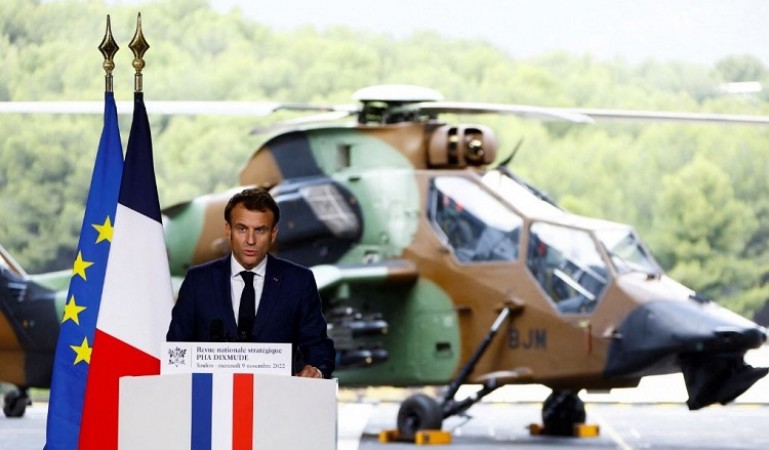
PARIS: French President Emmanuel Macron will lay out his nation's evolving economic and military policy in Africa over the coming years, as France's influence on the continent has significantly decreased.
Before beginning an ambitious journey to Africa on Wednesday, Macron is expected to push for a more balanced collaboration with African countries in a speech at the Elysee Presidential palace. He will visit Gabon, Angola, the Republic of Congo, and Congo.
The speech on Monday comes at a time when challenges to France's power on the continent are greater than they have been in decades. French forces were forced to leave Mali in less than a year, where the country turned to Russian military contractors, and most recently from Burkina Faso, which likewise appears to be looking more and more towards Moscow.
Street demonstrations against the former colonial power in a number of West and North African nations have been sparked by a rising anti-French sentiment. The expanding commercial presence of Russia, China, and Turkey is also posing a threat to France's long-standing economic links to the area.
A senior official at the French Presidency said, "It's not a tour that aims at entering into the race to restore a regretted influence." The goal of the excursion is not to "go back in time." With new strategies and tactics, it's more to respond to a demand for relationships and partnership, he said.
The official spoke under a pseudonym in accordance with the customs of the French Presidency. Particular attention will be paid to Mr. Macron's explanation of the modifications France would make to its military presence in the Sahel.
Once France withdrew its troops from Mali, he declared last year that the so-called Barkhane military mission had officially come to an end. In order to combat Islamic radicals in the Sahel region, French activities are now mostly concentrated in Niger and Chad, where the nation still has roughly 3,000 troops.
As part of his recent efforts to move away from post-colonial intervention, Macron maintained that any French involvement in Africa should be based on "partnership." The French official said, "It's vital that Europe and Africa get as united as possible and as, shall we say, as intimate in their interaction given the strategic risks ahead, whether it's conflict in Ukraine, economic shock, or pandemic shock.
The first French President born after the colonial era is Mr. Macron, 45. He has previously aimed to boost French investments in Africa's private sector and strengthen France's engagement with nations that use the English language, such Ghana and Kenya.
e will specifically visit Portuguese-speaking Angola during this week's travel with the intention of strengthening ties, particularly in the areas of agriculture and the food industry as well as energy, including oil and gas. Yet, there are already concerns about Mr. Macron's trip to central Africa this week.
Before the upcoming presidential election, which is set for later this year, some opposition activists in Gabon have criticised his visit because they believe it will strengthen President Ali Bongo Ondimba, whose family has dominated the country since the 1960s. In anticipation of a presidential election in December, comparable concerns have been voiced in Congo.
The President of the Republic, like all French authorities, "will exhibit total impartiality towards these elections before, during, and after this trip," the country's highest official declared. The Elysee emphasised that Mr. Macron is travelling to Gabon primarily to attend a significant forum on climate change that will put a special emphasis on forest preservation.
According to the Elysee, he will also work to demonstrate France's commitment to strengthening ties with the neighbouring Republic of Congo and Congo, two French-speaking nations, not only through talks with government officials but also by building relationships with local residents, business owners, artists, and activists.